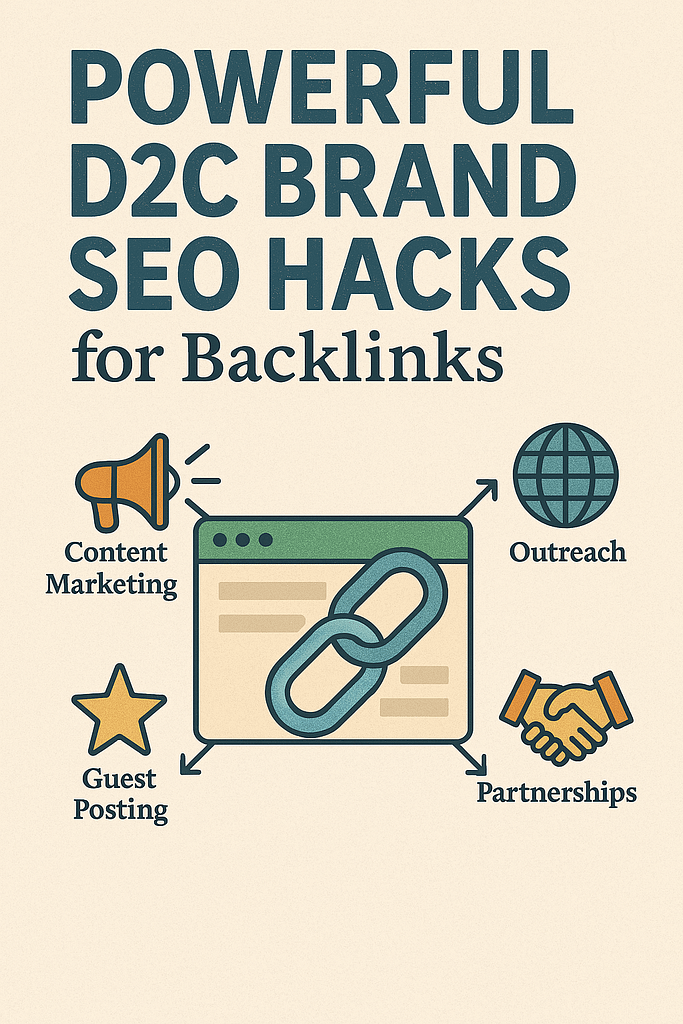Enhance your search rankings, drive organic traffic, and establish authority with proven link-building strategies tailored for direct-to-consumer brands. The secrets to building high-quality D2C Brands SEO Backlinks.
Why Quality Backlinks are Important for D2C Brand SEO ?
For Direct-to-Consumer (D2C) brands, creating high-quality backlinks is essential for a successful SEO strategy. Not only do these backlinks boost search engine rankings, but they also build credibility, drive organic traffic, and ultimately increase sales. In the competitive world of e-commerce, D2C brands must use innovative and targeted methods to stand out. Here are some effective strategies specifically designed for D2C brands to build high-quality backlinks.
Create Link-Worthy Content
The key to attracting natural backlinks is producing high-quality content that is valuable to your audience. This type of content is more likely to be shared and linked to by other websites.
- Long-Form Content: Research indicates that long-form content generates more backlinks than shorter pieces. For example, a D2C skincare brand might publish a detailed guide on “The Ultimate Skincare Routine for Sensitive Skin,” complete with actionable tips and product recommendations.
- Infographics: Visual content like infographics is highly shareable and often cited by other websites. A D2C fitness brand could create an infographic on “10 Benefits of Resistance Training” to attract links from fitness blogs and news sites.
- Data-Driven Research: Publishing original research or industry reports can position your brand as an authority. Other websites are likely to link back to your findings when citing data in their own articles.
By consistently creating content that provides value, you can naturally attract backlinks and build trust with your audience.
Leverage Digital PR Campaigns
Digital PR campaigns are powerful tools for generating quality backlinks while increasing brand awareness.
- Newsworthy Stories: Share unique aspects of your brand, such as sustainability initiatives or product innovations. BarkBox, for example, earned a backlink from The Washington Post by leveraging its unique product offering.
- Seasonal Campaigns: Tie your PR efforts to seasonal trends or holidays. A D2C fashion brand could launch a campaign around “Sustainable Holiday Gift Ideas,” pitching it to lifestyle blogs and media outlets.
- CSR Initiatives: Highlight corporate social responsibility efforts like charitable donations or eco-friendly practices. These stories often resonate with journalists and attract links from reputable publications.
Digital PR campaigns not only generate backlinks but also help build your brand’s reputation in the market.
Utilize HARO (Help a Reporter Out)
HARO connects journalists with industry experts looking for credible sources. Responding to relevant queries can earn D2C brands backlinks from authoritative publications.
- How It Works: Sign up as a source on HARO and monitor daily requests from journalists in your niche.
- Pitching Tips: Provide concise, valuable insights tailored to the journalist’s query. A D2C wellness brand, for instance, could respond to a query about “Top Wellness Trends in 2025” with expert advice.
While HARO outreach requires consistency and effort, it can result in high-authority backlinks that greatly boost SEO performance.
Partner with Influencers and Bloggers
Collaborating with influencers and bloggers in your niche is an excellent way to generate backlinks while expanding your reach.
- Product Reviews: Send free products to influencers or bloggers in exchange for honest reviews that include backlinks to your site. A D2C coffee brand could partner with food bloggers who review specialty coffee products.
- Guest Blogging: Write guest posts for authoritative blogs in your industry. Focus on providing value while subtly linking back to your website within the content.
- Unboxing Videos: Partner with influencers to create unboxing videos that showcase your products and include links in video descriptions or blog posts.
Building long-term relationships with influencers ensures ongoing opportunities for link-building collaborations.
Fix Broken Links
Broken link-building is a low-hanging fruit that can yield high-quality backlinks with minimal effort.
- Identify Broken Links: Use tools like Ahrefs or SEMrush to find broken links on competitor websites or niche blogs.
- Offer Replacement Content: Reach out to website owners and offer your content as a replacement for their broken links. For example, if a blog has a broken link about “Eco-Friendly Packaging,” a D2C brand specializing in sustainable packaging could provide relevant content.
This strategy benefits both parties—website owners fix their broken links while you gain valuable backlinks.
Turn Brand Mentions into Backlinks
Sometimes, websites mention your brand without linking back to you. These unlinked mentions are easy opportunities for acquiring backlinks.
- Identify Mentions: Use tools like Google Alerts or Mention.com to track where your brand is mentioned online.
- Outreach Strategy: Contact the website owner or editor with a polite request to turn the mention into a clickable link.
Since these sites are already familiar with your brand, they’re more likely to comply with such requests.
Collaborate with Complementary Brands
Partnering with non-competing but complementary brands can open up co-marketing opportunities that result in backlinks.
- Cross-Promotions: If you’re a D2C skincare brand, collaborate with a wellness company on joint blog posts or campaigns that link back to both websites.
- Affiliate Programs: Launch an affiliate program where partners promote your products in exchange for commissions and provide backlinks as part of their promotions.
These partnerships not only help build links but also expand your audience reach organically.
Contribute Expert Insights
Positioning yourself as an industry expert can lead to authoritative backlinks from reputable sources.
- Industry Panels and Webinars: Participate in events where you can share insights about your niche. Event organizers often link back to speakers’ websites.
- Niche Forums and Q&A Sites: Provide valuable answers on platforms like Quora or Reddit, linking back to relevant pages on your site when appropriate.
By establishing yourself as an authority figure in your field, you naturally attract high-quality links over time.
Build Resource Pages
Resource pages are curated lists of helpful tools, guides, or articles on specific topics—perfect for earning backlinks.
- Create Your Own Resource Pages: Develop pages like “The Ultimate Guide to Sustainable Fashion” or “Top Tools for Fitness Enthusiasts.”
- Outreach Strategy: Reach out to bloggers or website owners who maintain resource pages in similar niches and suggest adding your page as a valuable resource.
This strategy works particularly well if you’ve already created high-value content that fills gaps in existing resources.
Building high-quality backlinks requires strategic planning and consistent effort but offers immense rewards for D2C brands aiming to enhance their SEO performance and drive traffic to their websites.
By creating link-worthy content, leveraging digital PR campaigns, utilizing HARO opportunities, collaborating with influencers, fixing broken links, turning mentions into links, partnering with complementary brands, contributing expert insights, and building resource pages, D2C brands can establish credibility while improving search engine rankings.
These strategies not only help secure quality backlinks but also strengthen your brand’s presence across digital channels—ultimately driving organic growth and boosting sales in competitive markets like the United States and India.
Related Articles:







